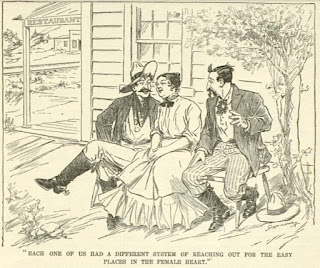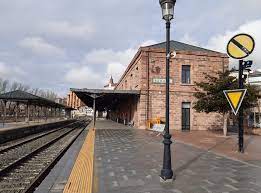BIOGRAPHY, by Begoña Devis
William Sydney Porter was born in North Carolina in 1862 and died in New York in 1910. He was a great writer known as O. Henry after a cat he lived with for a time. He is considered one of the masters of the short story. His admirable treatment of surprise narrative endings popularized in English the expression "an O. Henry ending".
He had an eventful life. His mother died when he was three, and he and his father moved to his paternal grandmother's house. As a child he was a good student, and a great reader. He graduated from his aunt's school, who continued teaching him until he was 15. He then began working in his uncle's pharmacy and finally graduated as a pharmacist.
In 1882 he went to Texas, hoping that a change of scenery would improve his persistent cough. There he worked there as a ranch hand, as a cook and as a nanny. When his health improved, he went to Austin, where he worked as a pharmacist and where he began writing short stories. He was popular in the social life in Austin for his storytelling and musical talent. At this time, his problems with alcohol abuse began. In 1887, he eloped with the young Athol Estes, daughter of a wealthy family. In 1888 they have a child, who died. In 1889, a new daughter, Margaret, was born.
In 1894, Porter founded a humorous weekly magazine called The Rolling Stone. Then that magazine collapsed, and he moved to Houston, where he was a journalist at the Houston Post.
The most transcendental event occurred in 1895, when he was accused by the First National Bank of appropriating money that he had under his responsibility. On the eve of the trial he sailed for Honduras, where he lived for seven months, and where he wrote several stories, many of which appear in the book Cabbages and Kings, in which he coined the term «banana republic», phrase subsequently used to describe a small, unstable tropical nation in Latin America.
In 1897 he returned to Austin when he knew that his wife was dying, and after a few months he was arrested and convicted, spending three years in the Columbus (Ohio) prison. There he continued writing short stories to support his daughter. When he was released from prison, he changed his name to O. Henry and moved to New York, where he lived until his death.
In New York, the city the writer loved and the setting for many of his stories, O. Henry gained public recognition, but he had a deep problem with his alcoholism. Indeed, there is an anecdote that his most famous story, "The Gift of the Magi", was written under the pressure of a deadline, in just three hours and accompanied by a whole bottle of whiskey.
From December 1903 to January 1906, he wrote a story a week for the New York World, his most prolific period. He remarried in 1907 to his childhood sweetheart, Sarah Lindsey Colem, who left him in 1909.
O. Henry died on June 5, 1910 of cirrhosis of the liver. His funeral was held in New York and he was buried in Asheville, North Carolina. His daughter, Margaret Worth Porter, died in 1927 and was buried next to her father.
In the United States, the O. Henry Award for short stories, one of the most important in the world, was created in his memory. Among other writers, it has been awarded to William Faulkner, Dorothy Parker, Flannery O'Connor, John Updike, Truman Capote, Raymond Carver, Saul Bellow and Woody Allen.
TELEMACHUS, FRIEND
The story begins when a hunter asks a man named Telemachus about his damaged ear, because it seems mutilated by a beast. Telemachus tells him that this ear is a mark of a really deep friendship between he and a man named Paisley, a friendship as strong as the one Damon and Pythias had.
He explained him that Telemachus and his friend spent seven years together, doing several jobs and living different experiences. Once they were in the town Los Piños and here they met a widow named Jessup, and both friends were attracted to her and each one wanted to marry her. But they didn’t want to lose their friendship and decided that if one of them reached her first, he would wait to the other to come before making advances, and would not do anything in secret. They decided to stay friends whoever won.
This situation ended up tiring the widow, who was most interested in Hinks and saw that he didn’t make any advance without being in the presence of his friend.
In spite of this, she still decided in the favour of Hicks and decided to marry him. At the wedding ceremony, Hicks asked the priest to wait until Paisley came. He finally came looking in his best, just in case the priest confuses them and marry Jessup to him instead Telemachus.
At night, after the wedding ceremony, Jessup waited in the room while Hicks sat outside. She asked him to come inside. He said her that he was waiting for his friend to come. After that Hicks felt as if somebody had shot his ear. In fact, it was a blow by Mrs. Hicks’s broom handle. This is the mark of his deep and truly friendship.
QUESTIONS
What kind of friendship do they have?
Which
is the first threat to this friendship?
What
do you know about Damon and Phytias?
What
is the meaning of this phrase: "anchovy to forget his vows"?
Describe
Mrs Jessup.
What
did Telemachus mean with "fidus Diogenes"?
What
was the problem with Spring Valley / Big Spring Valley?
What
is "to make a movement that leads up the widow to change her name to
Hicks"?
Try
to explain this image: "The smiles of a woman is the whirpool of Squills
and Chalybeates into which the vortex of the good ship Friendship is often drawn and
dismembered"?
What
is the "hot biscuit of Mrs Jessup"?
What
are the "medicinal whirpools"?
What
is a jew's harp?
What
was the woman reaction to their idea of shared courtship?
Describe
their different kind of courtshiping.
-Paisley
-Telemachus
Give
some information about
-Rider Haggard
-Lew Dockstader
-Parkhurst
What
does this mean: "when she can be referred as 'née Jones'"?
What
happened exactly in the paragraph "One night... but I didn't"? (page
171, lines 25-29)
Who
marries Mrs Jessup at last?
What happened to Lem's ear and why?
intent, dipper, graft, entitlement, churn, surcease,
habiliment, pry, anchovy, in hoc signo, dogwood, chip, accrue, japonica, hiatus,
railroad tie, Squills and Chalybeates, opodeldoc, hoss, synonymously, gallivantery,
dough, crock, cinctured, drought, pipeful, hike yourself down the gulch, disresume,
Lem, nix cum rous, Hubbard squash, wear the willow, cinch, cuff, bowery, durn,






